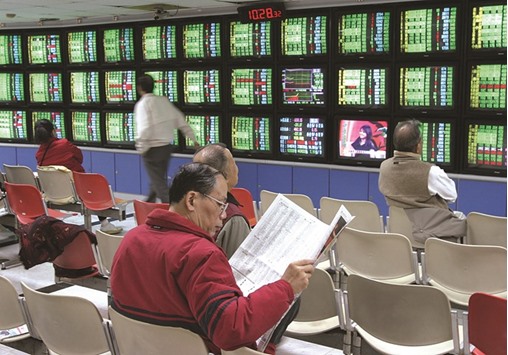Taiwan is on a tear. The island’s equities are attracting the most foreign cash in almost a year, with inflows topping any other Asian peer, and the benchmark Taiex index is up 18% from its bear-market low. Taiwan Semiconductor Manufacturing Co, the biggest stock on the gauge, surged to a record this week.
Investors are turning their attention to Taipei amid renewed optimism about economic prospects under President-elect Tsai Ing-wenand confidence that global demand for gadgets will buoy the component makers that dominate Taiwan’s bourse.
Equities have rebounded from a shaky start in January, when foreign investors fled on concern that an election victory by Tsai’s less China-friendly party would hurt relations.
“There was a lot of fear in the Taiwanese market ahead of the elections,” Shane Oliver, head of investment strategy in Sydney at AMP Capital Investors Ltd, which oversees about $118bn. “Nothing has really gone wrong since. Investors are starting to reallocate funds into Taiwan.”
Foreign asset managers pumped $2.9bn into Taiwanese shares so far in March, the second month of net inflows and already poised for the most since April, data compiled by Bloomberg show. That’s also the largest amount among eight Asian markets tracked by Bloomberg.
The Taiex’s 4.8% gain in 2016 compares with a 2.9% decline by the MSCI Asia Pacific Index, and the Taiwanese gauge is trading near the highest level relative to the broader measure in about a decade, data compiled by Bloomberg show.
Traders are loading up on options that protect against declines on the Taiex. The ratio of outstanding puts versus calls rose to 1.7 on Monday, the highest since the middle of 2014. The benchmark index climbed 0.4% at the close in Taipei on Thursday.
Chinese Premier Li Keqiang has pledged to fight any push by Taiwan to formalize its split from the mainland. While President-elect Tsai won over moderate voters wary of provoking China by pledging to uphold the “status quo” and focus on economic issues, she hasn’t endorsed the “one-China principle,” which underpinned eight years of improved ties between the former civil war foes during outgoing President Ma Ying-jeou.
“I don’t think the progress that’s been made and the stronger ties between Taiwan and the mainland can be unwound. I don’t think they can go backwards. I’m not particularly worried about that,” Bill Maldonado, Hong Kong-based global chief investment officer equities at HSBC Global Asset Management, which oversee $421bn of assets, said by phone. “Investors are looking forward and waiting to see what the policy agenda of the incoming government will be.”
Tsai, whose Democratic Progressive Party also won its first legislative majority, has promised to boost growth by focusing on five areas: biotechnology, green technology, national defence, smart machinery and the Internet of Things.
There’s scope for Taiwan’s central bank to cut interest rates this month to help the economy weather a slowdown in global trade, according to Goldman Sachs Group.
Taiwan’s exports to China dropped 13.7% in February from a year earlier due to slowing Chinese demand for Taiwan-made goods. China is planning more measures to boost cross-strait trade and economic cooperation, Premier Li said in his annual press conference on Wednesday.
Following the rally, shares on Taiwan’s benchmark index are valued at 14 times trailing earnings, compared with multiples of 9.3 times in Hong Kong and 13 times in Singapore, data compiled by Bloomberg show. Mark Mobius, executive chairman of Templeton Emerging Markets Group, said he remains underweight on Taiwan as there are cheaper stocks elsewhere in the region.
Pauline Dan, whose Pictet Greater China fund counts TSMC as its largest investment, sees room for further gains in the world’s top producer of chips used in smartphones and other gadgets. TSMC increased 1.6% on Thursday, closing at an all-time high.
“Globally there’s continuous growth in demand for electronics, for handheld devices, wearable products and robotics,” said Dan, head of Greater China equities at Pictet Asset Management in Hong Kong, which oversees about $164bn worldwide. “You need semiconductors for these and TSMC is at the forefront of the industry.”

Traders keep an eye on the stock prices at a securities trading company in Taipei. The Taiex’s 4.8% gain in 2016 compares with a 2.9% decline by the MSCI Asia Pacific Index, and the Taiwanese gauge is trading near the highest level relative to the broader measure in about a decade, according to data compiled by Bloomberg.
